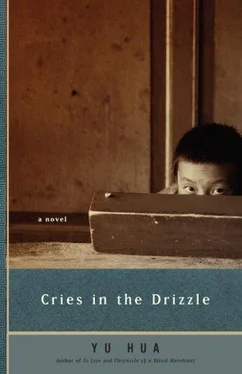The house on the corner was home to a teenager who wore a peaked cap. He could make music by blowing on a bamboo tube, something that seemed as wonderful to me in my early days in Lit-tlemarsh as the tree that grew out of the pagoda window. I would see him ambling down the street, hands in his pockets, greeting grown-ups he knew, and I quietly attempted to imitate the way he carried himself. But when I stuck my hands in my pockets and did my best to strut around, the image that I had so proudly cultivated was spoiled by Wang Liqiang's rebuke. He said I looked like a juvenile delinquent.
Aside from his other tunes, the boy in the cap could also produce an amazing likeness of the jingle that the pear-syrup candy vendor used to play. When a few other greedy children and I dashed toward the source of the music, we found that it was not the street vendor at all, but this boy sitting in the window, laughing hard as could be. Our silly expressions provoked him to such mirth that he ran out of breath and ended up coughing.
No matter how often I was taken in, I couldn't seem to stop myself from heading over there every time. Summoned by those sounds, I ran with a blind and witless instinct, just so that he could have a joke at my expense. But once I was mortified to find that I was the only child to fall for the trick, and his gleeful laughter was a blow to my ego. I said to him, “The sound you make isn't like the candy seller at all.” Thinking myself clever, I went on: “I knew it was fake as soon as I heard it.”
To my surprise he laughed even harder, and asked me, “So why did you come running?”
I could think of no answer to this.
One lunchtime we crossed paths when I was out buying soy sauce, and he found a new way of mocking me. After walking past me in the street, he suddenly came to a stop and called me over. Then he bent down, stuck his buttocks in the air, and asked me to check if there was a hole in the seat of his pants, where two red patches had been sewn. Peering at his monkeylike bottom, I had no idea that I was falling into a trap. “I can't see any hole,” I said.
“Take another look.”
I did as he said, but still saw nothing. “Bring your head a bit nearer,” he urged. As I put my face as close as I could get, he let out a resounding fart so foul I was practically gassed, and walked off laughing heartily. I couldn't help admiring him, even if he never missed an opportunity to tease.
Immersed in this new life, I often forgot the Sun Guanglin who had been tearing around the fields of Southgate not long before. Occasionally while I drifted off to sleep I could dimly make out my mother's blue-checked headscarf floating in the air. At such moments as these a sadness stirred, leaving me anxious and uneasy, but once I was asleep I forgot all about it. One evening, though, I did ask Wang Liqiang, “When will you take me back?”
He and I were walking hand in hand along the street as the sun was setting. He did not answer my question right away, but first bought me five olives. Then he told me, “Once you're grown up, that's when I'll take you back.”
Wang Liqiang, always so harried by his wife's afflictions, ruffled my hair and told me gravely that I should be obedient and study hard when I went to school. If I met his standards, he said, “When you're grown up, I'll find you a strapping young woman to marry.”
I had been wondering what kind of reward he would give me, and “a strapping young woman” came as a big disappointment.
After Wang Liqiang gave me the five olives, I no longer felt in any hurry to return to Southgate. This being a place where olives were provided, I had no wish to leave it any time soon.
Just once was I seized with a real urge to reclaim my old life. One afternoon I mistook for my big brother a boy who had hung his satchel over his chest and put his hands behind his back. At that moment I forgot that I was in Littlemarsh and thought I was back by the pond in Southgate, watching my big brother showing off on his first day home from school. I raced toward him, calling “Sun Guangping!” But my excitement drained away as an unfamiliar face swung around, looking baffled, and only then did I remember that I had left Southgate long ago. The jolt back to reality left me feeling bereft. Sobbing, I went on my way as the north wind whistled in my ears.
I made friends with a boy called Guoqing, whose birthday was October 1, and another boy named Liu Xiaoqing. When I think of them now, my heart tingles. Walking along those stone-paved streets, we would jabber and quack like three little ducklings.
Of the two, I was more fond of Guoqing. He was a boy who loved to run around. The first time he raced up to me he was pouring with sweat. Though I did not know him at all, he asked me warmly, “You're good in a scrap, aren't you? From the look of it, you really know how to fight.” My bond with Liu Xiaoqing, on the other hand, was a by-product of his brother's delightful flute-playing. The fact that he was the brother of the boy with the peaked cap meant that my affection for him was colored by envy.
Guoqing was the same age as me, but already possessed leadership ability, and he won my loyalty by bringing spice and variety to my life. I'll never forget that time in the summer when he took me and Liu Xiaoqing down to the riverside to wait for the waves. Before that excursion I had no idea what wonderful pleasures were in store for me there. We stood in a row, evenly spaced along the riverbank, and after a steamboat passed its wake would lap over our bare feet and the waves would climb up our ankles. Our feet were like boats moored to the shore, swaying in the water. But soon I had to go home to clean the windows and mop the floor. As Guoqing and Liu Xiaoqing watched a boat in the distance steadily steaming closer, I had to leave, rushing home as fast as my legs would carry me.
Another unforgettable joy was going upstairs in Guoqing's house to view the countryside off in the distance. In those days, even in a town, not many people lived in a two-story house. When Liu Xiaoqing and I went to Guoqing's place, we were as excited as two twittering sparrows. Guoqing, for his part, displayed the poise one would expect from a host. Walking between us, he rubbed his nose with his hand, concealing his childish pride with a grown-up's smile.
Then Guoqing knocked on a door. The door opened only a little, revealing half a wizened face. Guoqing called loudly, “Hi, Grannie.”
The door opened just enough to admit Guoqing, revealing the dim interior and the face of an old lady dressed in black. Her eyes were watching us with a brightness surprising for someone of such advanced years.
As Liu Xiaoqing started to go in, she swiftly pushed the door almost completely shut, leaving only one of her eyes visible. I heard her hoarse voice for the first time. “Let me hear you say ‘Grannie.’”
Liu Xiaoqing said the magic word and was admitted; then it was my turn. Again the door opened just a crack and a single eye peered out at me. The old lady gave me the creeps. But Guoqing and Liu Xiaoqing were already pounding up the stairs, so I had no choice but to call out the required greeting, at the same time giving a shiver. I gained admission to the inner darkness, and after she had closed the door the only light came from the top of the staircase. As I climbed the stairs, I heard no sound of her steps moving away and realized with dismay that her sharp old eyes must be watching me.
In the two years that followed, my eagerness to visit Guo-qing's house was always tempered with dread at having to pass the old lady's gloomy checkpoint. Her face and her voice, which often figured in my nightmares, began to haunt me. In order to work up the courage to knock on the door, I had to remind myself there was no greater pleasure than leaning out the upstairs window with Guoqing.
Читать дальше












